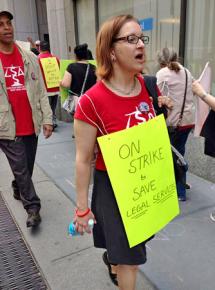Legal services workers confront concessions
, a member of 1199SEIU at the Legal Aid Society, reports on what's at stake in a strike of members of a sister union at Legal Services NYC.
"WE'RE LEGAL Services for the poor! We're fired up, can't take it no more!"
These and other chants are filling the streets in front of Legal Services NYC (LSNYC) offices in all five boroughs, where workers are on strike against concessions that seem more geared toward undermining the union and job security than any immediate financial concerns.
LSNYC is the largest provider of free civil legal services in the nation. The Legal Services Staff Association (LSSA), a unit of the National Organization of Legal Services Workers (NOLSW), Local 2320 of the United Auto Workers, is a "wall-to-wall" union, which means that it represents all 200 workers at LSNYC--clerical and administrative workers, paralegals, social workers and lawyers.
These are the people who defend low-income New Yorkers from eviction, foreclosure, loss of public benefits, deportation and more. Workers at LSNYC provide services to over 40,000 low-income New Yorkers every year, among them victims of domestic violence, the disabled, those with HIV/AIDS.

Like many large non-profits, LSNYC is run by a board of directors dominated by those who live lives far removed from the clients served and workers employed. Board Chair Joseph Genova, for example, is a partner at Milbank, Tweed, Hadley and McCloy, where compensation tops $2.5 million a year.
Union members at LSNYC have been without a contract since last July. The LSNYC's top management and its board have demanded huge givebacks from the union: Significant cuts to health care coverage for particularly vulnerable members and families, higher employee contributions to health care costs, a 29 percent reduction in employer contributions to retirement plans and a zero cost-of-living increase to salaries.
LSNYC is using predicted future cuts in federally funded Legal Services Corporation money to demand concessions now. However, LSNYC has conceded that it projects a $10.5 million budget surplus at the end of 2013 and conservatively expects $2 million to 3 million in additional funding per year in 2013 and 2014. Members, having already taken concessions in their prior contract, refused to accept these unprecedented concessions. The vast majority voted to strike on May 15.
Union members are also concerned about efforts by management and the board over the last several years to restructure LSNYC, turning formerly union positions into higher-paid management positions--to the point where LSNYC now has one manager for every three union members.
The union has said it will accept concessions on health care equivalent to those demanded by management in exchange for job security language that would ensure that any future layoffs decrease the ratio of managers to staff to a more rational level. But management has been uninterested in even addressing the ratio.
THUS, WORKERS at LSNYC are fighting not only to defend their own benefits, but also to secure high-quality legal services to poor and underprivileged people.
The concessions around health care and the retirement plan in particular seem targeted at driving out more experienced employees. Just as education is being reshaped by programs which cycle recent colleges graduates through out cities' schools for a few years before moving on to other careers, the concessions being demanded at LSNYC could greatly increase turnover and undermine retention of experienced staff.
Union members at LSNYC have started to receive solidarity from other unions across the city. The United Federation of Teachers and 1199SEIU are among the unions that have passed resolutions in support of the strike. Members of the Professional Staff Congress from the City University of New York and Transport Workers Union Local 100, as well as 1199 and UAW members at the Legal Aid Society have been walking the picket lines, which are regularly serenaded by honks of support from passing trucks and buses. An upcoming June 12 rally of all city unions is an opportunity to link these struggles further.
Forty-two members of the New York City Council have also signed on to a letter to LSNYC management expressing concern over the devastating impact of the strike on the clients LSNYC serves. The letter also specifically questions the necessity of the cuts given LSNYC's surplus, the extremely high management-to-staff ratio and management's unwillingness to come to a fair agreement.
Even greater solidarity and support is needed to defend quality legal services for all. The LSSA strike comes at a critical time for the labor movement and working people in general. Nationally, strike levels are at a record low. Every municipal union in New York is currently working without a contract. Every year, a new round of schools and hospitals are closed in New York City.
While not technically public workers, the attack on LSSA is part and parcel of the overall attack on the public sector and the very idea that low-income people deserve access to basic services and resources. It's also a part of an overall employers' strategy to take advantage of a weak recovery--including a dismal job market for law school graduates--and ongoing economic insecurity to permanently undermine benefits and wages.
The fight at LSNYC is a fight for all of us. All union members in New York City need to be come out and support the struggles that are popping up around town, from the recent school bus drivers' strike to the current fights at LSNYC and Trade Fair Supermarkets. As LSSA members have been chanting on the picket line: "Get up! Get down! New York City is a union town!"


